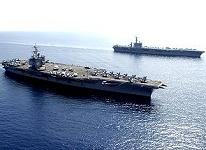“God help us if that man in the White House preemptively bombs Iran,” said Robert Duncan, assistant professor of political science. “Then the ship will really hit the sand, and any hope we had of supporting moderates in Iran will be gone. If we take military action we’ll turn them all against us.” In recent weeks, the United States and Iran have squared off in a series of increasingly belligerent exchanges that many people fear could lead to war.
The already tense relationship between the two countries has become further inflamed by Iran’s nuclear program and alleged support of Hamas and Hezbollah, both of which are officially listed as terrorist organizations by the United States
The Bush administration has also accused Iran of meddling in Iraqi internal affairs and, as quoted in The Economist, a Feb. 2 military intelligence memo reported “Iranian lethal support for select groups of Shia militants (in Iraq).”
The USS John C. Stennis aircraft carrier and its accompanying strike-force were deployed to the Persian Gulf in late January, a move seen by many as a show of U.S. strength meant to intimidate Iran. The Stennis is the second U.S. carrier strike-force operating in the region. Iran’s elite Revolutionary Guards responded by testing new land-to-sea missiles.
“(Our new missiles) can hit different kinds of big warships in all of the Persian Gulf, all of the Sea of Oman and the north of the Indian Ocean,” said Ali Fadavi, a senior Revolutionary Guards naval commander, on state-controlled television.
“Our enemies know very well that any aggression will have a response from all sides by Iranian people on their interests all over the world,” Ayatollah Ali Khamenei, the supreme religious leader of the Iranian theocracy, said. “American politicians know that the Iranian people will not leave any aggression without a response.”
Although Bush has not rescinded statements made last year that “all options are still on the table” concerning Iran, the Bush administration has dismissed Khamenei’s statements, saying that rumors of an attack on Iran are unfounded.
“Let’s see, I’ve said it, the secretary of defense has said it, the president has said it: We’re not invading Iran,” said Tony Snow, the White House spokesperson, according to The New York Times.
Despite these assurances from the White House, many fear that the tense climate will lead to a confrontation.
“It’s a strange thing when people say America or Iran; I don’t get an image of anything human. I just think of the governments as a whole,” said sophomore Nasimeh Easton, who is of Iranian descent and has many family members who live in Iran. “The governments are the only people acting in this, and they are stubborn and hardheaded. Honestly, it terrifies me. There is a big distinction between the government of Iran, the mullahs, and the people, my uncles, aunts and cousins over there.”
“George W. Bush is trapped by his own rhetoric,” Duncan said. “He has labeled them as a part of ‘the Axis of Evil.’ The neo-conservative ideology puts everything into terms of good and evil, black and white, and he has already labeled Iran evil. And he won’t negotiate with the devil.”
In a letter to The British Sunday Times, three former U.S. military leaders warned against military clashes with Iran, saying “a strategy of diplomatic engagement with Iran” would better serve U.S. interests.
“An attack on Iran would have disastrous consequences for security in the region, coalition forces in Iraq and would further exacerbate regional and global tensions,” the letter stated. “The current crisis must be resolved through diplomacy.

